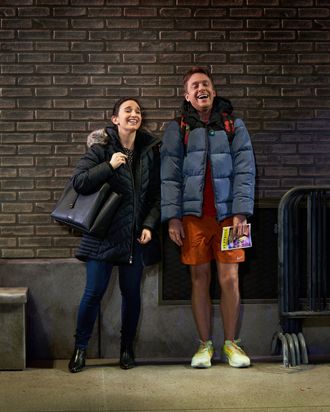
The meta-conversation about theater — how does it actually get made? How do we consume it? — has been on many of our minds lately. A billion shows opened in April; then the Tony nominations sent all us theater dorks into a fist-shaking (or fist-pumping) tizzy. But does that tizzy actually serve a purpose? Does something strange happen to admiration when it turns into fandom? Tug at just one thread of theatrical super-enthusiasm and you do find a messy tangle in your hands — full of treasures, sure, but also uncomfortable and unsayable things about entitlement, damage, and love.
You couldn’t write Which Way to the Stage without being a fan yourself. The first fight — sorry, conversation — in Ana Nogueira’s comic drama is a deeply informed, often hilarious debate over the best Gypsy. Jeff (Max Jenkins) argues for Patti LuPone (“I want to be afraid of my Momma Rose”); Judy (Sas Goldberg), more preoccupied with narrative realism, throws down for Bernadette Peters (“That version of the story breaks my fucking heart”). If you don’t know what they’re talking about, good luck — and if you do, take notes. They’re demonstrating the good parts of obsessive engagement: the way it heightens perception, experiences, friendships.
When we meet them, the best friends are waiting outside the 2015 Idina Menzel vehicle If/Then, hoping to get their programs signed. The show is actually still onstage; when they saw it, Idina (“She is every one of us! She is normal life — set on fire!”) didn’t greet her fans, so they’re staking out the stage door on a subsequent night, waiting for what they feel they’re owed. They return again … and again. In Mike Donahue’s production, even the scenes set in downtown bars and audition rooms take place in this grim alley behind the Richard Rodgers Theatre, precisely re-created by set designer Adam Rigg. You thought a show about Broadway would have bright lights and tinsel? Be grateful there aren’t rats.
The sheer speed of Jeff and Judy’s talk, full of supportive asides — they are each other’s biggest fans — and breakneck passion sweeps us along with it. Not only do they feel like avatars for a theatergoing New York audience (a reference to the Glass House Tavern gets a knowing laugh); they’re the wittiest versions of that kind of aficionado. They’re in the game, too. Judy, according to Jeff, has a world-class voice and an inability to free her inner diva; Jeff, according to Judy, excels as a drag superstar, a bolt of sizzling charisma. We’re encouraged to believe these assessments by a seductive third figure who appears to trouble their double act: Mark (Evan Todd), an improbably perfect guy Judy meets at an audition for Avenue Q.
Both Jeff and Judy feel that they own un-ownable things. Judy bridles at Jeff’s new club performance, a version of her precious Idina that she feels verges on lampoon; Jeff argues that gay authors created roles like Momma Rose, so “they were written for me.” Mark becomes something else to covet. Nogueira gives herself a lot of ground to cover in this script, including internalized sexism, self-sacrifice, the politics of drag, guys who do not mention their bisexuality, drunk bachelorettes crashing the queer scene (here represented by Michelle Veintimilla in one of her small, but killer, roles) and art. She’s opening many thematic doors, but we return again and again to the If/Then alley because she knows it contains the key to all of them. True fans believe we possess the people who perform for us, and since everyone, everywhere is always performing, we think we own one another, too.
Where Stage gets a little unsteady is when it turns its attention from fandom to the art form itself. The play that has been so keen-eyed about sentimentalizing the industry starts to sentimentalize a little towards the end. Nogueira also makes poor sexy Mark do a variety of things to keep the twists going — you feel him becoming more plot-puppet than human. And a lot rests on the show-me-what-you’ve-got moments, like Jeff’s drag act, which don’t deliver.
Yet as anyone who saw If/Then can tell you, great performances have their own logic. Goldberg and Jenkins, both excellent individually, are frankly incredible as a duo. According to Goldberg’s Instagram (I’m not stalking, I’m a fan), the two performed Sam Shepard and Patti Smith’s Cowboy Mouth together when they were 15. I hate to raise that bar for other actors, but perhaps you do actually need a decade and a half of living down a piece of gonzo Americana performed in “jazzercise clothes” to find such lived-in ease and split-second timing. Judy’s career and Jeff’s will probably never intersect; they’ve got different strengths, and they’re never auditioning for the same shows. Nogueira’s genius lies in realizing that it’s a travesty to break up a set like these two — that if there’s a stage door that keeps them out, she can simply write a play that lets them in.
Which Way to the Stage is at the Robert W. Wilson MCC Theater Space through May 22.


